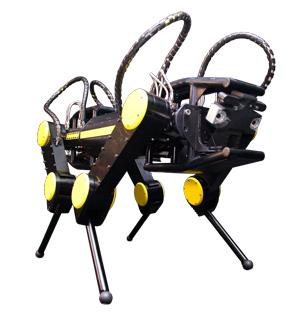Moog invests in a new joint-lab MOOG@IIT for the development of next generation technologies for autonomous robots. Investments by Moog will be devoted to equipment and staff.

L’Istituto Italiano di Tecnologia, and Moog Inc. – US based multi-national and leading designer and manufacturer of high performance motion control solutions– launched a joint-lab (MOOG@IIT) to develop autonomous quadruped robots able to support and substitute humans for tasks in dangerous and dirty environments. Building blocks of the project are the robotic platform HyQ, designed and developed by one of the research groups of the Advanced Robotics department at IIT (53 staff members), and the MOOG ISA actuator, the “muscle” of the robot, for improved control of its joints while negotiating rough terrains.
Moog and IIT started their collaboration years ago on the iCub robot, which is using electric motors that were custom-designed and produced for IIT by the Italian branch of Moog Components Group at Casella, near Genoa. With the joint-lab, Moog decided to further invest in the rising sector of autonomous robotics to develop a new business area. Emergency-response robots (useful in case of earthquakes, fires, nuclear disasters, remote area inspection) are increasingly important and many countries, such as USA, China, Japan and South Korea, have already invested in this technology. IIT’s quadruped robot HyQ represents one of the most promising platforms for applications in the near future.
Thanks to Moog and IIT’s investments in equipment and staff, IIT scientists and Moog engineers will work together -on the development of the quadruped robot for outdoor use. The final goal is to develop a complete solution that will be commercially available. Separately, Moog intends to commercially launch a family of specialty ISA hydraulic actuators, like those used in HyQ, in spring 2017.
One of the most innovative research lines of the MOOG@IIT joint-lab will be the optimization of the ISA, responsible for HyQ’s movements, in order to make the robot lighter, more agile and to improve its performance. Two key features make the Moog actuators particularly suitable for this project. Integration: a single compact body embeds the electronic system, which controls the “muscles”, the hydraulic system, which feeds the “muscles” and ensures fast reaction, and the pressure and motion sensors. Integration means simplicity (integrated channels for hydraulic flow and electric wires), light-weight (920 g) and robustness. Secondly, the hydraulic valves (used also in F1 cars) operate at 350 Hz, enabling the system to control joint-level torque in thousandths of a second. Such speed is critical because the robot must be able to quickly react when its “foot” strikes an uneven surface.
HyQ– Hydraulic Quadruped is a hydraulically powered robot created by researchers at the Italian Institute of Technology since 2007. It was developed as a platform for the study of dynamic robotic motions, such as running and jumping, over rough terrain. Its body weighs 80 kg and is covered by a structure made of plastic, glass fiber and Kevlar, protecting the control unit from impacts and environmental pollutants. The four-legged robot has 12 joints, with a maximum rotation angle of 270 degrees, and several sensors to measure the ground surface properties and detect obstacles on its path. The maximum trotting speed is 2 m/s.
IIT has already initiated 6 joint laboratories (Nikon, Inail, DirectaPlus, Novacart, Leica, CrestOptics), with 5 million euros of private investments only in 2015. The institute has applied for over 360 patents since 2009, and established 14 start-up companies crowdfunding 13 million euros and creating 60 new job positions.
MOOG
Moog Inc. is a worldwide designer, manufacturer, and integrator of precision control components and systems. Moog’s high-performance systems control military and commercial aircraft, satellites and space vehicles, launch vehicles, missiles, automated industrial machinery, wind energy, marine and medical equipment. Additional information about the Company can be found at www.moog.com.






